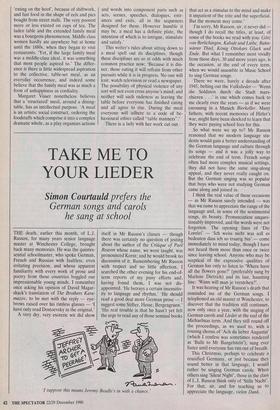TAKE ME TO YOUR LIEDER
Simon Courtauld prefers the
German songs and carols he sang at school
THE death, earlier this month, of L.J. Russon, for many years senior language master at Winchester College, brought back many memories. He was the quintes- sential schoolmaster, who spoke German, French and Russian with faultless, even irritating precision, and whose apparent familiarity with every work of prose and poetry from those countries boggled our impressionable young minds. I remember once asking his opinion of David Magar- shack's translation of The Brothers Kara- mazov, to be met with the reply — eye- brows raised over his rimless glasses — 'I have only read Dostoevsky in the original.'
A very dry, very esoteric wit did show
itself in Mr Russon's classes — though there was certainly no question of jesting about the author of the Critique of Pure Reason whose name, we were taught, was pronounced Kornt; and he would brook no discussion of it. Remembering Mr Russon with respect and no little affection, I searched the other evening for his end-of- term reports of my puny efforts and, having found them, I was not dis- appointed. 'He betrays a certain insensitiv- ity to language and rhythm.' He should read a good deal more German prose — I suggest some Stifter, Hesse, Bergengruen.' `His real trouble is that he hasn't yet felt the urge to read any of those seminal books 'I suppose this means Jeremy Beadle's in with a chance.'
that act as a stimulus to the mind and make it impatient of the trite and the superficial. But the moment may come.'
I'm sorry, Mr Russon, sir, it never did though I do recall the titles, at least, of some of the books we read with you: Gotz von Berlichingen, Kabale und Liebe, Bahn- warter Thiel, Kiinig Ottokars Gluck und Ende. But what I remember most vividly from those days, 30 and more years ago, is the occasion, at the end of every term, when we would assemble in Music School to sing German songs.
There we were, barely a decade after 1945, belting out the Volkslieder — 'Wenn die Soldaten durch die Stadt mars- chieren . . .' is one which comes back to me clearly over the years — as if we were carousing in a Munich Bierkeller. Many fathers, with recent memories of Hitler's war, might have been shocked to learn that they were paying school fees for this.
So what were we up to? Mr Russon reasoned that we modern language stu- dents would gain a better understanding of the German language and culture through its songs — and it was a jolly way to celebrate the end of term. French songs often had more complex musical settings, they did not have the same sing-along appeal, and they never really caught on. But the German singing was so popular that boys who were not studying German came along and joined in.
I think the real value of these occasions — as Mr Russon surely intended — was that we came to appreciate the range of the language and, in some of the sentimental songs, its beauty. Pronunciation unques- tionably improved, and the words were not forgotten. The opening lines of 'Die Lorelei' — `Ich weiss nicht was soil es bedeuten dass ich so traurig bin' — come immediately to mind today, though I have not heard them more than once or twice since leaving school. Anyone who may be sceptical of the expressive qualities of German has only to listen to 'Where have all the flowers gone?' (preferably sung by Marlene Dietrich) and its last, haunting line: 'Warm will man je verstehen?'.
It was hearing of Mr Russon's death that reminded me of the German songs. I telephoned an old master at Winchester, to discover that the tradition still continues, now only once a year, with the singing of German carols and Lieder at the end of the Michaelmas term. And they still round off the proceedings, as we used to, with a rousing chorus of `Ach du lieber Augustin' (which I confess was sometimes rendered as 'Balls to Mr Bangelstein'), sung ever faster until everyone has run out of breath.
This Christmas, perhaps to celebrate a reunified Germany, or just because they sound better in that language, I would rather be singing German carols. When others sing 'Silent Night', those in the class of L.J. Russon think only of 'Stifle Nacht'. For that, sir, and for teaching us to appreciate the language, vielen Dank.


































































































 Previous page
Previous page